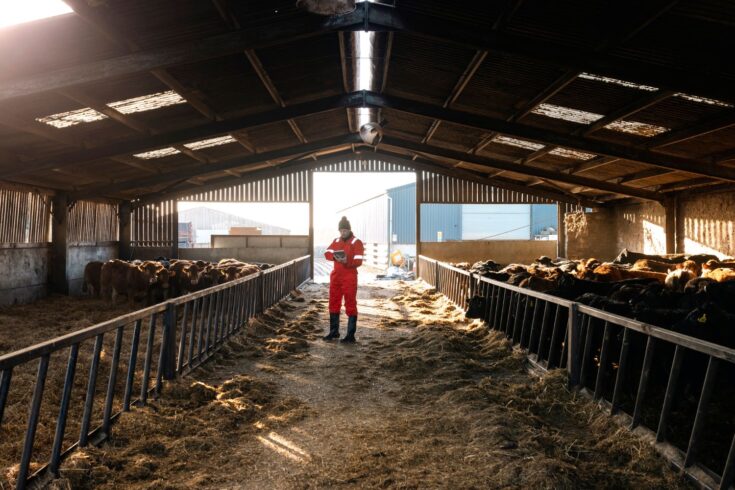Following the completion of round one of the large research and development (R&D) partnerships competition, three cutting-edge projects have been announced as winners of over £9.13 million in funding.
The large R&D partnerships competition is under the Department for Environment Food and Rural Affairs’ Farming Innovation Programme.
The competition, which is being delivered by Innovate UK’s Transforming Food Production challenge, tasked applicants to submit solutions that will significantly improve productivity, sustainability and the environmental impact of farming.
Projects should also support the progression towards net zero emissions, and to enhance resilience and reduce threats from pests and disease.
The winners
The funding will support projects developing robotic crop harvesting for horticulture, an autonomous system to improve cow health, welfare and productivity, and a more environmentally-friendly approach to potato cultivation.
The Agri-Opencore project, led by APS Produce, is looking to accelerate the delivery of robotic crop systems for horticulture.
It aims to create the necessary software and hardware for a development platform that receives contributions from stakeholders across the sector to create a system that could bring robotic harvesting to farms sooner.
The AG ARC project, led by Garnett Farms Engineering, is developing an autonomous bedding system for cows that will improve its monitoring and dispensing.
It aims to reduce incidences of mastitis in cows by sensing moisture and temperature within cubicles and providing bedding in response, thereby supporting animal health and farm productivity aims.
The Potato-LITE project, led by PepsiCo, is exploring new cultivation equipment and systems for potato farming that reduce the impact on soil health and the costs of cultivation.
The project aims to reduce damage from the number, depth and intensity of current techniques in order to improve longer-term resilience in the sector.
Funding opportunities
This is all part of the government’s commitment to spend around £600 million on grants.
It aims to provide support for farmers to invest in productivity, animal health and welfare, innovation, research and development over three years.
This is being funded out of the £2.4 billion annual farming budget.
The three projects are being supported through the large R&D partnership grant competition, which is part of the government’s £270 million Farming Innovation Programme.
A second round of the large R&D grant is currently open for applications until 19 April.
Looking into the future
Farming Minister Mark Spencer said:
It’s important that we fund projects like these – and those still to come in future rounds – as we support farmers to deliver sustainable food production and protect the environment.
Innovation, research and development will help keep the sector at the cutting edge of technology as we look into the future.
Value of partnerships and collaborations
Katrina Hayter, Interim Executive Director Healthy Living and Agriculture, Innovate UK, said:
These projects have all demonstrated not only an innovative solution to a real-life, on-farm problem, but also the value of partnerships and collaboration between different sector experts.
For novel technology to truly succeed, it needs the input of the farmers themselves for the day-to-day realities of its use.
We’re really pleased that these partnerships have this idea at their core, and we now look forward to working with them as they develop their solutions further and bring the benefits to life.
Further information
Successful projects
Agri-Opencore project
The Agri-Opencore project, led by APS Produce, has been awarded £3.8 million to accelerate the delivery of robotic crop systems for horticulture.
With labour shortages affecting the horticulture sector around the world, there are huge opportunities to reduce costs and labour requirements in the sector.
The funding will help the project create the world’s first open development platform (software and hardware) for agri-robotic crop harvesting.
The open development platform will enable multiple organisations to contribute and exploit the platform to accelerate the development and adoption of robotic harvesting of crops in England.
AG ARC project
The AG ARC project, led by Garnett Farms Engineering, has been awarded £2.5 million towards the development of an autonomous cow cubicle bedding unit.
Cow comfort is a key factor in reducing the chances of cows suffering from mastitis, a fatal inflammation of their mammary gland, with dry and clean bedding and careful management of cubicles being vital.
Currently, this must be done manually by farmers, but this project will develop an intelligent robotic cubicle bedder.
The robotic cubicle bedder will autonomously and safely navigate the cubicle shed to monitor and respond to key sensor data of moisture and temperature on the cubicle bed to optimise dispensing of bedding.
This will help to boost animals’ health and welfare costs, improve farms’ productivity and reduce costs through efficient use of bedding.
Potato-LITE project
The Potato-LITE project, led by PepsiCo, has been awarded £2.8 million to explore better systems of potato cultivation.
Current systems of potato cultivation require intense and frequent disturbance of the soil, with deep, destoned seedbeds necessary to avoid tuber damage.
And while reduced tillage technologies are enabling regenerative agriculture in cereal systems, this technology has not been developed for root crop production, such as potatoes.
Potato-Lite aims to develop new cultivation equipment and systems with farmers and the wider supply chain, focusing on reducing the depth, intensity and number of operations required.
Therefore, it will not only improve soil health and reduce the environmental impact of the sector, but it will also reduce costs to make the £824 million potato sector more resilient.
Top image: Credit: SolStock, E+ via Getty Images

